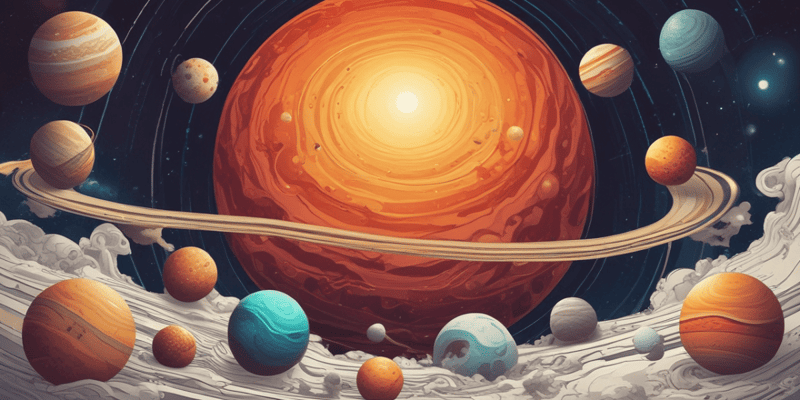Podcast
Questions and Answers
What primarily composes the Oort Cloud?
What primarily composes the Oort Cloud?
What is the diameter of the Oort Cloud?
What is the diameter of the Oort Cloud?
What do mold fossils preserve?
What do mold fossils preserve?
Which statement is true regarding dwarf planets?
Which statement is true regarding dwarf planets?
Signup and view all the answers
Which concept is central to uniformitarianism?
Which concept is central to uniformitarianism?
Signup and view all the answers
What is the primary result of water seeping into rock regarding fossils?
What is the primary result of water seeping into rock regarding fossils?
Signup and view all the answers
How does the concept of uniformitarianism relate to natural disasters like tornadoes?
How does the concept of uniformitarianism relate to natural disasters like tornadoes?
Signup and view all the answers
What characterizes both molds and casts in fossil formation?
What characterizes both molds and casts in fossil formation?
Signup and view all the answers
Which principle states that rock layers at the bottom are older than those on top?
Which principle states that rock layers at the bottom are older than those on top?
Signup and view all the answers
What phenomenon can cause rock layers to become curved or vertical?
What phenomenon can cause rock layers to become curved or vertical?
Signup and view all the answers
Which principle explains that inclusions in rock layers are older than the rocks containing them?
Which principle explains that inclusions in rock layers are older than the rocks containing them?
Signup and view all the answers
Which statement about the Great Oxygenation event is correct?
Which statement about the Great Oxygenation event is correct?
Signup and view all the answers
What does the Cross-Cutting Relationship principle indicate about geological features?
What does the Cross-Cutting Relationship principle indicate about geological features?
Signup and view all the answers
What is a cast in paleontology?
What is a cast in paleontology?
Signup and view all the answers
Which dating method uses Carbon-14?
Which dating method uses Carbon-14?
Signup and view all the answers
Which type of rock is absolute dating most effective for?
Which type of rock is absolute dating most effective for?
Signup and view all the answers
What does relative dating determine?
What does relative dating determine?
Signup and view all the answers
Which eon is characterized by visible life?
Which eon is characterized by visible life?
Signup and view all the answers
What is the function of periods in geological time?
What is the function of periods in geological time?
Signup and view all the answers
Who pioneered the theory on how geological strata were laid down?
Who pioneered the theory on how geological strata were laid down?
Signup and view all the answers
What type of dating provides a low precision of age?
What type of dating provides a low precision of age?
Signup and view all the answers
Which classification is the shortest subdivision in geological time?
Which classification is the shortest subdivision in geological time?
Signup and view all the answers
What is biostratigraphy mainly used for?
What is biostratigraphy mainly used for?
Signup and view all the answers
What characteristic describes the terrestrial planets?
What characteristic describes the terrestrial planets?
Signup and view all the answers
Which planet is the hottest in the solar system?
Which planet is the hottest in the solar system?
Signup and view all the answers
Which of the following is NOT a characteristic of Jovian planets?
Which of the following is NOT a characteristic of Jovian planets?
Signup and view all the answers
Where are short-period comets primarily located?
Where are short-period comets primarily located?
Signup and view all the answers
Which statement about asteroids is true?
Which statement about asteroids is true?
Signup and view all the answers
Which planet has the largest volcano in the solar system?
Which planet has the largest volcano in the solar system?
Signup and view all the answers
What is a meteorite?
What is a meteorite?
Signup and view all the answers
What is the primary composition of Saturn's rings?
What is the primary composition of Saturn's rings?
Signup and view all the answers
What distinguishes the Oort Cloud?
What distinguishes the Oort Cloud?
Signup and view all the answers
What is a primary characteristic of comets?
What is a primary characteristic of comets?
Signup and view all the answers
What defines a meteoroid?
What defines a meteoroid?
Signup and view all the answers
Which characteristic is TRUE for Venus?
Which characteristic is TRUE for Venus?
Signup and view all the answers
Which planet is often referred to as 'the Blue Planet'?
Which planet is often referred to as 'the Blue Planet'?
Signup and view all the answers
What primarily characterizes Jovian planets' atmospheres?
What primarily characterizes Jovian planets' atmospheres?
Signup and view all the answers
What geological process results in fossils being formed through the replacement of an organism's structure with minerals?
What geological process results in fossils being formed through the replacement of an organism's structure with minerals?
Signup and view all the answers
Which event is associated with the Cambrian explosion?
Which event is associated with the Cambrian explosion?
Signup and view all the answers
What major development allowed for the stabilization of oxygen in Earth's atmosphere during the Proterozoic eon?
What major development allowed for the stabilization of oxygen in Earth's atmosphere during the Proterozoic eon?
Signup and view all the answers
Which mass extinction event is known for wiping out approximately 96% of marine species?
Which mass extinction event is known for wiping out approximately 96% of marine species?
Signup and view all the answers
Which era is characterized by the rise of mammals after the extinction of dinosaurs?
Which era is characterized by the rise of mammals after the extinction of dinosaurs?
Signup and view all the answers
What was the dominant life form during the Mesozoic Era?
What was the dominant life form during the Mesozoic Era?
Signup and view all the answers
Which significant geological event led to the first emergence of land plants?
Which significant geological event led to the first emergence of land plants?
Signup and view all the answers
During which period did the first eukaryotes appear?
During which period did the first eukaryotes appear?
Signup and view all the answers
Study Notes
Solar System Overview
- Planets closest to the Sun include Mercury, which has a rocky crust with craters and is essentially spherical due to gravity.
- Mercury experiences extreme temperatures — cold on one side and hot on the other, with a gray color.
- Dwarf planets like Pluto, Eris, Haumea, Makemake, and Ceres are found in the asteroid belt and do not clear their orbits.
Planetary Characteristics
- Venus: Second planet from the Sun, known as "the evening star" or "the morning star", has a toxic atmosphere, is the hottest planet, and appears orange due to high levels of greenhouse gases.
- Earth: The third planet from the Sun, referred to as the "Blue Planet", uniquely harbors liquid water and likely supports life.
- Mars: Known as the "Red Planet", features have two moons, extensive canyon systems, and the largest volcano in the solar system, with a very thin atmosphere.
Gas Giants and Their Features
- Jupiter: The largest planet with swirling gas, possesses 80 to 95 moons, very thin rings, and a prominent storm known as the Great Red Spot.
- Saturn: Recognized for its stunning rings made of ice and rock, is the second largest planet and has 60 moons.
- Uranus: Notable for its unique tilt of 90 degrees, primarily composed of methane, exhibits winds and a blue-green hue.
- Neptune: Farthest major planet with two dark spots and was the first planet discovered through mathematical predictions.
Comets, Asteroids, and Meteors
- Comets: Icy bodies that emit gases; visual features depend on elements present.
- Meteors: Streaks of light produced when meteoroids enter Earth's atmosphere.
- Meteoroids: Rocky or metallic fragments from asteroids, comets, or planets, while meteorites are meteoroids that land on Earth.
- Asteroids: Mostly found in the asteroid belt; Ceres is the first asteroid discovered, sometimes referred to as minor planets.
Geological Time Scale
- Organized by the appearance and extinction of life forms, based on geological and fossil records.
- Two main dating techniques: Absolute Dating provides exact ages, typically for igneous rocks, using methods like radiometric dating; Relative Dating determines the chronological order of events with lower precision.
Steno's Laws of Stratigraphy
- Superposition: Older rock layers are below younger layers.
- Original Horizontality: Rock layers originally form horizontally.
- Lateral Continuity: Rock layers extend laterally; gaps may separate them.
- Cross-Cutting Relationships: Geological features that cut through are younger than the rocks they affect.
- Inclusion: Pieces within a rock layer are older than the surrounding material.
Types of Fossils
- Petrification: Formation when minerals replace organic structures.
- Compression: Occurs from the burial of organic material in sediments.
Major Eons and Eras
- Hadean Eon: Formation of Earth and early oceans; first life forms began appearing.
- Proterozoic Eon: Development of multicellular life and the ozone layer.
- Paleozoic Era: Explosion of marine life, emergence of amphibians, and significant coal deposits.
- Mesozoic Era: Age of reptiles and dinosaurs, indicated by the existence of Pangaea.
- Cenozoic Era: Following dinosaur extinction, diversification of mammals and the rise of humans.
Mass Extinctions
- Notable mass extinctions include:
- Ordovician-Silurian (440 million years ago, 86% extinction)
- Late Devonian (365 million years ago, 75%)
- Permian-Triassic (252 million years ago, 96%)
- Triassic-Jurassic (201.3 million years ago, 80%)
- Cretaceous-Paleogene (66 million years ago, 60%)
Studying That Suits You
Use AI to generate personalized quizzes and flashcards to suit your learning preferences.
Description
Test your knowledge about planets with this quiz focused on their unique characteristics. Explore aspects such as their proximity to the sun, surface features, and temperature variations. Perfect for students of astronomy and space science.




